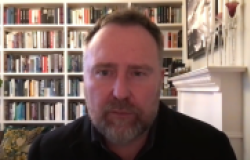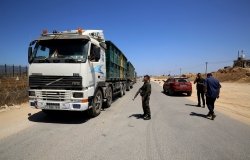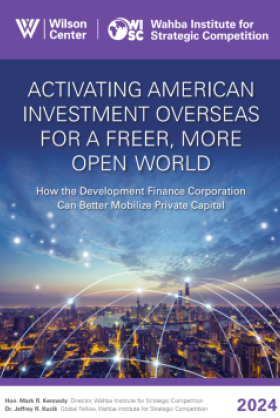Losing Hearts and Minds: From Bush to Obama
Roger Hardy, Public Policy Scholar, Woodrow Wilson Center, and Former Middle East and Islamic Affairs Analyst, BBC World Service
Overview
In addressing the ability of the United States to win Muslim "hearts and minds," former BBC World Service analyst Roger Hardy discussed the challenge of undermining Al-Qaeda and the radical Islamists, who are perceived as a threat by the United States, without alienating the rest of the Islamic world.
On January 26, 2011, the Middle East Program hosted a discussion on "Losing Hearts and Minds: From Bush to Obama" with Hardy, Public Policy Scholar, Woodrow Wilson Center. Haleh Esfandiari, Director of the Middle East Program at the Woodrow Wilson Center, moderated the event.
Hardy explained the inherent contradiction between the expressed desire of the United States and its allies to engage the Muslim world and their military entanglement in Iraq and Afghanistan. He argued that the West's agenda in the Middle East has been contradictory because the combination of outreach and military endeavors make the establishment of a long-term and cooperative relationship hard to achieve.
Hardy discussed whether hearts and minds can be won, or if public diplomacy efforts have been tarnished and how U.S. efforts to defeat its enemies have alienated a large portion of the Muslim world. He argued that while public diplomacy has traditionally been a function of the State Department, continued efforts have been stymied by underfunding, understaffing, and the lack of a long-term strategy, pointing to the asymmetry between State and Defense within the U.S. budget.
Hardy also discussed how new U.S. counterinsurgency strategies also have a crucial 'hearts and minds' component. He said the successes -- for example, at the development level, in building roads, schools and bridges -- did not ultimately or fundamentally challenge the Al-Qaeda narrative. In fact, Hardy argued, Western military engagements in Iraq and Afghanistan have only reinforced the Al-Qaeda narrative of Muslim humiliation and Western aggression.
Hardy noted the importance and persuasiveness of President Obama's Cairo speech, in which he presented the counter-narrative to extremists' claims. He saw this as a demarcation of the difference in approaches between former President George W. Bush and President Obama.
Hardy called for recognition of the socioeconomic drivers of violent Islamism and for the perception of the United States as the "new imperial power". He contended that he was not suggesting the Obama administration do anything it was not already committed to, or that was not in the U.S. interest. However, he concluded, changing the perception would require changing the reality.
By Sara Girgis, Middle East Program
Haleh Esfandiari, Middle East Program
Speaker
Hosted By

Middle East Program
The Wilson Center’s Middle East Program serves as a crucial resource for the policymaking community and beyond, providing analyses and research that helps inform US foreign policymaking, stimulates public debate, and expands knowledge about issues in the wider Middle East and North Africa (MENA) region. Read more
Thank you for your interest in this event. Please send any feedback or questions to our Events staff.










